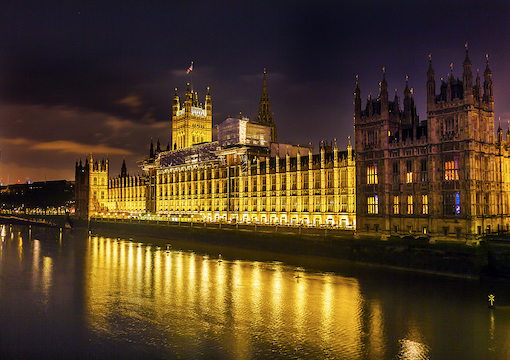
August 22, 2022

Houses of Parliament, London
Source: Bigstock
For Britons who—given the chance—would vote to Make Britain Sane Again, the current leadership convulsions within the Tory Party have brought into sharp relief a stark reality: They have gradually been disenfranchised, no longer having any political party to truly represent them. The British political class and media are currently obsessing about the party’s search for a replacement for Boris Johnson. The shortlist has narrowed to a runoff between ex-chancellor Rishi Sunak and Foreign Secretary Liz Truss. The most salient thing to note about these candidates is that neither seems to think in terms much deeper or broader than the latest thing the BBC-dominated MSM has to say on any given subject.
In the early stages of the leadership contest there were two genuinely conservative candidates. One is Kemi Badenoch, a young MP and junior minister who has consistently spoken against all the fashionable pseudo-intellectual ideas that have seduced so many of her colleagues: white privilege, colonial guilt, critical race theory, excessive preoccupation with the more absurd outer reaches of LGBT+ rights, etc. The other is Suella Braverman, who is worth quoting for these observations about our Western malaise:
In essence rights have come to fill the space once occupied by generosity…. [Perhaps] we should adopt a Universal Declaration of Responsibilities and Duties…should question the dilution of our sense of duty, the demotion of our grasp of responsibility and our virtual abandonment of the spirit of civic obligation.
Both these bright hopes were eliminated early on by their fellow MPs…as just too conservative. The current sorry state of the Tory Party is only the culmination of a long-term erosion of its philosophical foundations. This bankruptcy—combined with an entrenched leftist political monoculture within the country’s civil service, NGOs, legal establishment, and media—has ensured that twelve years of “conservative” rule have seen the restraining hand of conservative governance conspicuous by its absence. This has been the case in every arena—all the way from attempts at “woke” indoctrination of school children; to the kowtowing to various “identity” pressure groups; to the neutralizing of any attempts to control borders or to maintain law and order more generally. It has been particularly weak-kneed in recent times given that the party currently enjoys a huge parliamentary majority—an electoral lucky break that has been entirely wasted. If conservatism can loosely be defined as a counterweight to the excesses of Progressive hyper-liberalism, then other Westerners should look on all of this with foreboding.
Britain famously led the world into an Age of Liberalism and is now at the forefront of what pessimists fear might be its end stage—as in the idea that Western Liberalism may have always contained the seeds of its 21st-century ruination. The following is my stab at identifying the nature of this tragedic Fatal Flaw, extrapolating from the particular case of Britain.
One thing not well understood about Britain’s heyday as the great 19th-century bastion of capitalist enterprise is that, right from the start, the rapid expansion of its middle class gave rise to a contrary force. The hard-driven, muck-and-brass first generation often spawned a second-generation class disdainful of “trade” and wanting to feel more sophisticated than thou—the seed bed of a nascent Progressive intelligentsia. Instead of rooting one’s self-worth in one’s ability to produce things, the highly schooled and “educated”—particularly in the arts and burgeoning public sector—began to derive their sense of self from a spurious conceit of themselves as champions of Social Justice.
Fast-forward to the post-WWII era and the age of mass media. Britain’s citizenry is now wrapped in a TV news comfort blanket of apparent democratic control over their national destiny through the mechanism of pluralist party politics. They have become endlessly distracted by this left-vs.-right electoral psychodrama whilst, out of media scrutiny, the field is left clear for “radical” politicos to secure all the bases of real power: the permanent institutions of government and civil society. The generally light touch of Western liberal polity has made it a soft touch. It has been an open door for every one-track-minded malcontent with a certificate in grievance studies; every psychologically needy virtue signaler “educated” into some or other kind of delicious guilt trip. Every arrested-adolescent attention-seeking narcissist desperate to think themself “radical.”
But this early-21st-century woke utopianism coexists with a residual parallel universe. Those millions who have missed out on “higher education” or are just too old to get with the new vibes continue to inhabit this universe. Once they’ve done their half-hour-or-so daily dose of The News, they just get on with minding their own business. They tend not to “feel passionate” about abstract causes, not having been so thoroughly inducted into abstract “caring” as a cost-free way to really feel good about yourself. They are a bit “binary.” Their vocabulary is light on words with a phobia suffix.
If there is any hope for mounting an effective defense of this older form of liberalism, it would be found in a radical remake of the real engine of hyper-liberalism: the teaching professions. Any right-leaning academic is balefully aware of their status as a tiny, barely tolerated minority. And journalistic talk about “the woke elite” misses the point that, in Britain, thanks to the rampant expansion of post-18 schooling, this “elite” now comprises maybe 50 percent of the population—when viewed as a spectrum from mild to psychotic virtue-signaling. The upper half now receive a “higher education,” the state’s gift that keeps on giving them a therapeutic sense of themselves as the good guys in a world of endless grievance and victimhood. Some rebel against this conditioning, but many more do not.
But Britain has not been alone in this. Western educational institutions have, for decades now, been given carte blanche in the—highly tendentious—“education” of the young. In the digital age and with homeschooling, it is questionable whether acquiring a liberal education necessarily still requires teachers and classrooms at all.